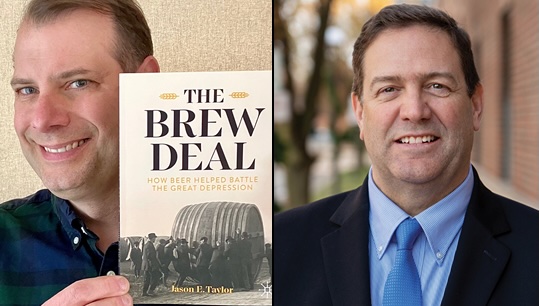
- This event has passed.
Jason Taylor & Micheal LaFaive – TapTalk

Jason Taylor is an economist, economic historian, and a professor at Central Michigan University. In addition to being published in academic journals his work has also been seen in the Wall Street Journal, Forbes, and the Detroit News. His new book is titled, “The Brew Deal: How Beer Helped Battle the Great Depression.”
Topic: Economists have long been critical of Franklin D. Roosevelt’s New Deal. One New Deal policy that even the staunchest FDR critic can get behind was also one of the earliest. On April 7, 1933 (today we celebrate April 7 as “National Beer Day” for this very reason) beer was declared non-intoxicating so that its production and sale would no longer violate the 18th Amendment’s prohibition of “intoxicating liquors.” With 13 million Americans out of work, it was hoped that beer’s return would create not just employment for the brewer, but also the server, the delivery truck driver, the makers of glass bottles, steel kegs, wooden barrels, refrigeration equipment, and all the other various goods and services tied to beer. And it worked. The freedom to legally drink a beer after more than 13 years of Prohibition also boosted the nations spirits—which is one of the most powerful economic stimuli available. Taylor will discuss the profound economic impact beer’s return had on Michigan, and the United States as a whole, in helping battle the Great Depression in the spring of 1933.
Michael LaFaive is an economist and senior director of the Morey Fiscal Policy Initiative at the Mackinac Center for Public Policy where he has worked for 30 years. He has written extensively about Michigan’s alcohol control system, including a study titled, “Alcohol Control Reform and Public Health and Safety.”
Topic: As Prohibition came to an end states were tasked with developing their own systems of control. What exists today is a creative and sometimes humorous patchwork of laws and rules that often do more to encourage favor seeking among alcohol sellers than facilitate public health and safety. Many of these laws and rules micromanage the sale and consumption of alcohol in head scratching ways. In his talk LaFaive will discuss how states’ alcohol control regimes often unnecessarily raise costs on consumers and taxpayers. He’ll conclude his talk with a short list of recommendations for reform.